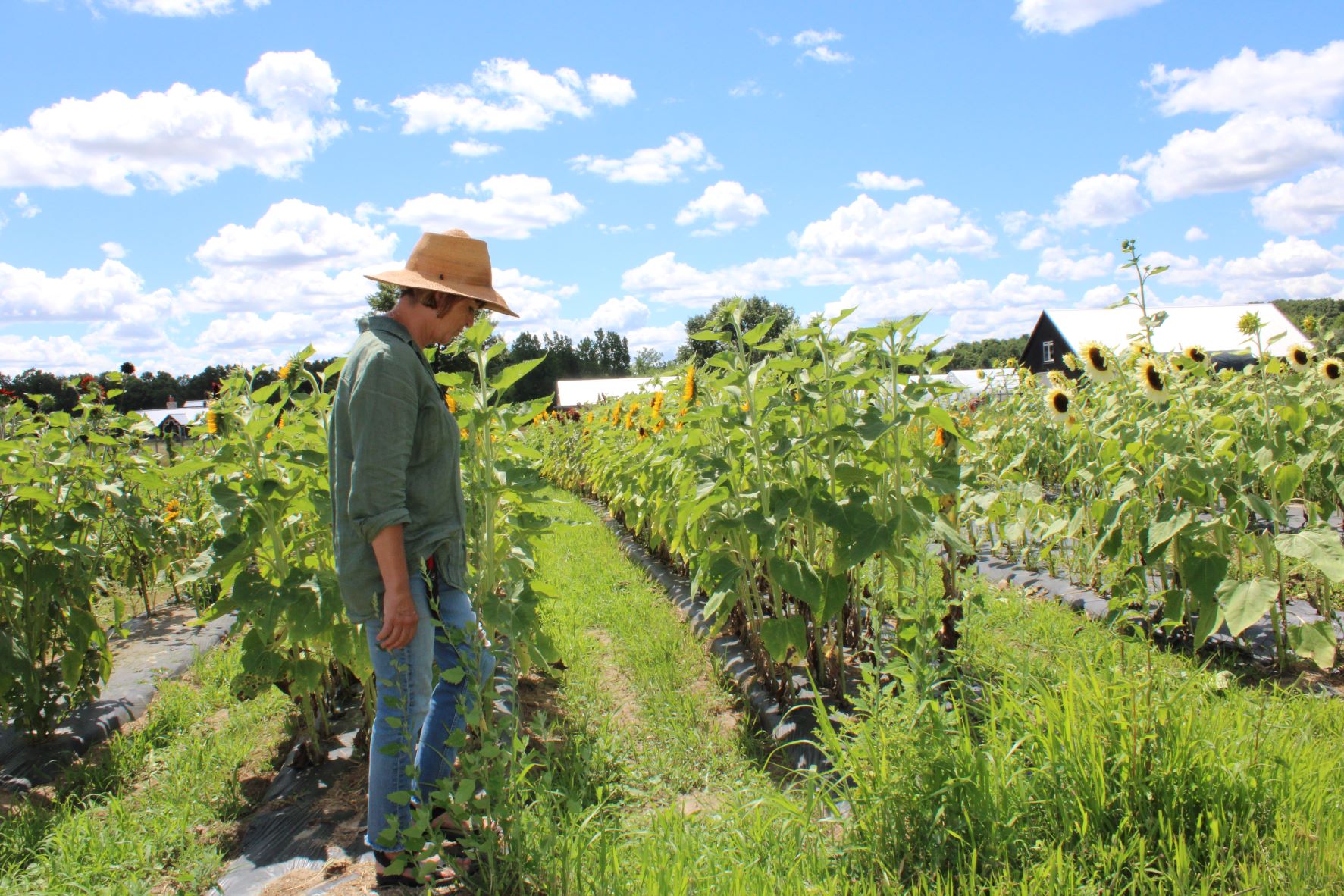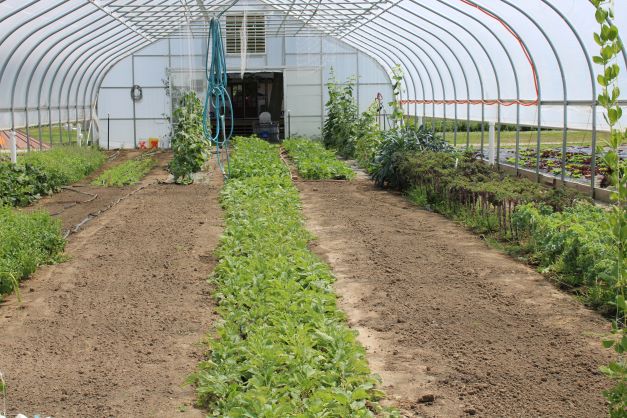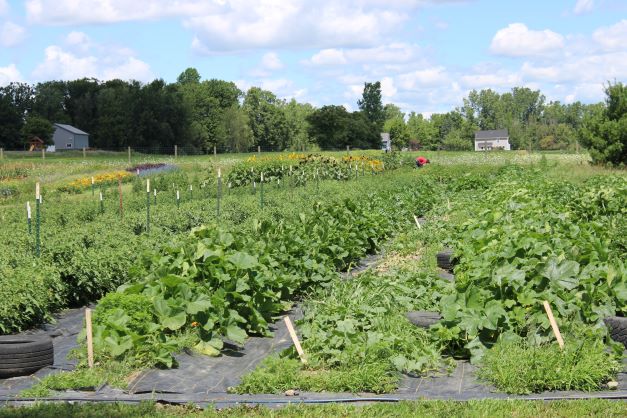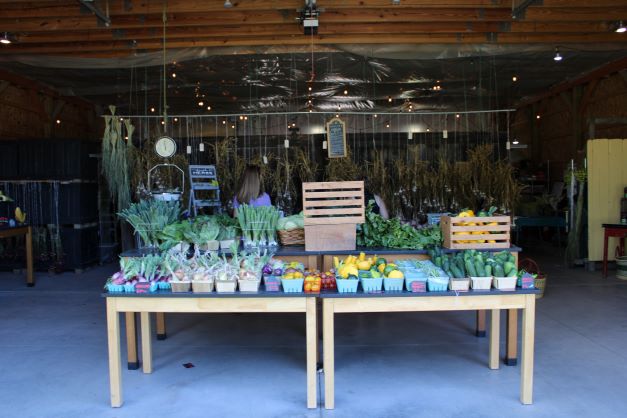
Nov 10, 2022
Cold Frame farming
Founded in 2012, Cold Frame Farm is a 27-acre USDA-certified organic farm. Lisa and her team are committed to regenerative farming practices and sustainability.
A myriad of organic greens, roots/stems, herbs and even flowers, seeds and bulbs are grown. The farm bees pollinate the crops and wildflower fields and make delicious honey too.
Lisa Jaroch was drawn to farm life from a childhood love of the TV series, “Little House on the Prairie.” With that and her love of organic foods, she soon started her own organic farm. Lisa’s dream of running an organic farm came to life when she and her husband Matt took a bare piece of land outside the Village of Romeo in Michigan and turned it into a thriving organic farm, producing a wide variety of nutrient-dense produce for restaurants and members of the local community.
“This is our 10th year. I’m a landscape architect and worked down in Detroit for years,” Lisa said. “I did a lot of environmental projects with sustainability and all things good for the environment, as well as a little bit of design.”
Back to the 1600s
In 2008, when the U.S. was in a recession, the company where Lisa worked downsized. Lisa was kept on, however. In fact, she also decided to teach a graphics class at Michigan State University. Though both jobs meant many, many hours, Lisa liked it. It was a learning experience for her, too.
“I learned about the student organic training program at Michigan State for utilizing high tunnels, affectionately called ‘hoop houses,’” Lisa explained. In the 1600s, these were referred to as “cold frames,” and that is where Lisa and Matt’s farm name was born.

In the past, cold frames were built attached to the outside south-facing wall of a greenhouse. Lisa said that the cold frames like in Europe on the ground with glass on top of them to sustain themselves through the winters. The greenhouse was heated, and the cold frame was not. In the spring, the plant starts were moved from the greenhouse to the cold frame to acclimate (or harden off) to cooler temperatures. Today, the practice is becoming popular again.
“I was intrigued with being able to grow food in the winter without using power. And that’s what we do in these high tunnels – what everyone calls ‘hoop houses now,’” Lisa said.
This type of farming saves energy, because “the way we orient them and the way that they’re engineered, we don’t have to use heat in them, and we don’t have to use ventilation or fans,” Lisa added. And this is their summer fruit house.
“So, like our tomatoes right now, we do one grow in the spring here so that we can force fruit and we get as much as we can out of a small space as we can,” Lisa explained. Having them inside the hoop house keeps disease off and they can control the environment. They love the heat and do really well, she added.
Out of the 27 acres, they only farm three acres. Those three, however, are grown well with all the produce listed throughout the year.
Regenerative practice
Lisa and Matt pride themselves on being a unique farm. With growing produce 12 months of the year, there is no downtime.
“We do everything by hand, and so we aerate and don’t bring any machines in,” said Lisa.

The soil is kept healthy too. Cover crops are part of the regenerative farming practices that Lisa and Matt follow. They believe it helps to restore the landscape and foster a sustainable way of living. Most importantly, they want to contribute to the health and happiness of their neighbors and friends.
They do a lot of crop rotation. “Healthy transplant equals healthy plants and that helps us immensely to keep disease down. We do green manure cover-cropping,” Lisa said. She also picks cultivars and if they work for us and they’re disease resistant and have good flavor, she sticks with them.
Everything is grown for flavor and that’s why we sell to the chefs, said Lisa. “Sometimes I will sacrifice a whole bed and feed it to the chickens if I just can’t get it right.”
They plant 30% more of everything that they need, 10% more transplants, 50% or whatever of different things, as they expect some loss due to uncontrollable measures.
Cold Frame also uses drip irrigation in all fields “so I can at least water if we don’t get much rain.” Yet Lisa finds the melons and squash have better flavor without a lot of rain because they are not watered down.
A crew, a family
Lisa considers her staff as family. One can see when visiting the farm how close all employees are. The crew, Emma, Alyssa, Meg and Ben (and sometimes more) are like Lisa and Matt’s own children (who also work the farm).
Visitors at the store will also find Levi, Jasmine, Ink and Emmy wandering about – the farm dog and cats are either out in the fields near the crew or in the farm store greeting guests.
Each crew member has his/her own unique qualities about them. Emma is the farm manager (and Lisa’s right hand). She knows the transplant schedule by heart and can run the farm store with a hand tied behind her back.
Alyssa is the production manager who “gets stuff done.” She recently earned a degree in integrative nutrition.
Meg is a florist and the farm marketing director, along with being a photographer.
Ben is earning a master’s degree online in agro forestry. He works the fields with zest, weeding, planting and whatever he is asked to do.
Speaking of photos, Cold Frame Farm boasts an abundant selection of photo opportunities for professional shoots: fields of stunning flowers, rows of foliage, pastures of native wildflowers and grasses, the striking black barn, unique hoop houses and plenty of open space that welcomes golden sunset light.
The ’60s turquoise F-150 truck can be used, parked wherever the photographer wants for the duration of the shoot. Take photos in the bed, the cab or use it as a background prop to give your photos a retro feel.
Farm store
Walking into the store, you will first notice the crates of fresh produce. Next, you will likely notice the hanging garlic. The farm store is stocked with seasonal produce and much more. Variety after variety of fresh produce ― such as heirloom tomatoes, spinach, salad mixes and cucumbers to kohlrabi, celeriac and Japanese turnips ― are just some favorites. Honey, seasonal flowers, eggs, specialty boxes, garlic, handwoven baskets and organic essentials, including organic maple syrup, apple cider vinegar, herbal tea, dried herbs and fruit, are on hand. Freshly made baguette breads with flavors like rosemary and onion poppy, and rosemary and garlic parmesan create a smell worth savoring.

The store is open April through November, 10 a.m. until 3 p.m. on Fridays and Saturdays. There is a constant crowd that includes weekly regulars and first timers. It seems Lisa knows every visitor walking through the Farm Store entrance. She goes over every product they buy like it is a product of love (and it is).
When the store closes, you will find the crew working tirelessly in the hoop houses.
Community supported agriculture
Community supported agriculture (CSA) is a system that connects farmers directly to consumers. Cold Frame Farm’s CSA provides members with a weekly share of the fresh, organic produce that is harvested all summer. Variety and quantities will vary each week based on what is in season, but no matter what, you’ll receive a collection of fresh produce and organic goodies.
The CSA runs for 20 weeks. A full share will consist of eight to 10 items the first four weeks, increasing to eight to 16 items as the season progresses. Alternatively, a half share will include four to five items in the first four weeks, before increasing to four to eight items. Members can pick up their share of produce from the Farm Store during business hours.
You will find nothing short of a small village farm here. Every aspect has been thought-out, designed and readied for as much variety as possible. And who knows what’s next at Cold Creek Farm.
Lisa likes to say that if she can dream it, Matt can build it.






